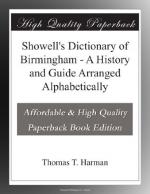Embezzlements.—In 1871, W. Harrison, the Secretary of the Birmingham Gas Company, skedaddled, his books showing defalcations to the amount of L18,000. When the company was dissolved, L100 was left in a bank for Mr. Secretary’s prosecution, should he return to this country.—July 12, 1877, the secretary of the Moseley Skating Rink Company was awarded twelve months, and the secretary of the Butcher’s Hide and Skin Company six months, for similar offences, but for small amounts.
Forgeries.—In the year 1800, seven men were hung at Warwick for forgery, and with them one for sheep-stealing. The manufacture of forged bank-notes was formerly quite a business here, and many cases are on record of the detection and punishment of the offenders.—June 28, 1879. the Joint Stock Bank were losers of L2,130 through cashing three forged cheques bearing the signature of W.C.B. Cave, the clever artist getting ten years—Nov. 15, 1883. John Alfred Burgan, manager of the Union Bank, for forging and uttering a certain order, and falsifying his books, the amounts embezzled reaching L9,000, was sentenced to fifteen years’ penal servitude.—On the previous day Benjamin Robert Danks was similarly punished for forgeries on his employer, Mr. Jesse Herbert, barrister, who had been exceedingly kind to him—Zwingli Sargent, solicitor, was sentenced to five years’ penal servitude, April 28, 1885, for forgery and misappropriating money belonging to clients.
Fortunetelling is still far from being an uncommon offence, but “Methratton,” the “Great Seer of England,” alias John Harewell, who, on March 28, 1883, was sentenced to nine months hard labour, must rank as being at the top of the peculiar profession. Though a “Great Seer” he could not foresee his own fate.
Highwaymen.—The “gentlemen of the road” took their tolls in a very free manner in the earlier coaching days, notwithstanding that the punishment dealt out was frequently that of death or, in mild cases, transportation for life. The Birmingham stage coach was stopped and robbed near Banbury, May 18, 1743, by two highwaymen, who, however, were captured same day, and were afterwards hung.—Mr. Wheeley, of Edgbaston, was stopped in a lane near his own house, and robhed of 20 guineas




